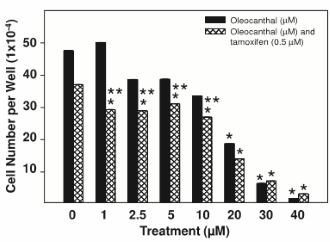|
How propolis kills breast cancer cells
Propolis is a sticky substance that bees make and which they use to seal the inside of their hives. Supplements manufacturers put the same propolis into capsules and tablets intended to stimulate the immune system. Researchers at New York University may now have discovered a new application for propolis. In the Journal of Cancer Science and Therapy they describe how propolis in theory can protect women against breast cancer.
CAPE
Researchers have known for several years already that propolis kills cancer cells in test tubes. Scientists suspect that the cancer-inhibitory effect of propolis is due to flavonoid compounds such as chrysin and quercetin, decano-acid analogues and above all caffeic acid phenethyl ester, often abbreviated to CAPE.
In the 2010s, researchers at New York University published the results of in-vitro studies in which caffeic acid phenethyl ester was shown to kill hormone-sensitive and hormone-insensitive breast cancer cells [Cancer Lett. 2011 Sep 1;308(1):43-53.] and also breast cancer stem cells. [Invest New Drugs. 2012 Aug;30(4):1279-88.]
The reason that scientists are so interested in caffeic acid phenethyl ester is its high bioavailability. Researchers find the molecule in unexpectedly high concentrations in the blood after intake. The structural formula of caffeic acid phenethyl ester is shown here.
The chemical structure of caffeic acid phenethyl ester resembles that of vorinostat, a relatively new anti-cancer medicine. The chemical structure of vorinostat is the lower of the two on the right. Merck has marketed Vorinostat under the name Zolinza since 2006. Given the similarities between the two compounds, the researchers wondered whether the naturally occurring caffeic acid phenethyl ester would work in the same way as vorinostat, which attaches itself to the histone deacetylase enzyme.
The figure below shows how this happens. Once vorinostat [SAHA] has nestled in the enzyme, the histone deacetylase can no longer do its work. So vorinostat is a histone deacetylase inhibitor.
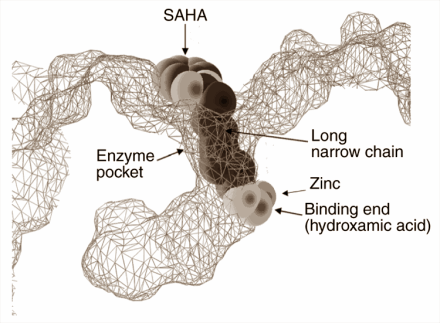
Histone deacetylase inhibitors
Histone deacetylases tidy up in the cell nucleus. They wrap up DNA so the strands of genetic material are not just floating around in the cell, so they don't get in the way of other processes and don't get damaged either. Because the cells can't read wrapped up DNA, histone deacetylases therefore deactivate genes. Only temporarily, if things go as they are supposed to.
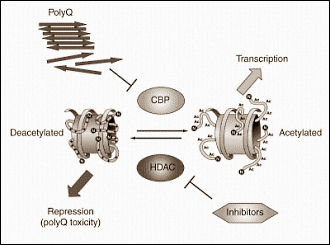
But cancer cells abuse histone deacetylases, and use them to permanently deactivate many genes. Cancer cells deactivate as many functions as they can so they can divert more energy to their own growth. Oncologists hope that histone deacetylase inhibitors can reactivate these functions, so that cancer cells become more vulnerable and can be more easily fought with chemotherapy or immunotherapy.
The figure below shows that both caffeic acid phenethyl ester and the natural propolis extract deactivate histone deacetylase in hormone-sensitive MCF-7 breast cancer cells. The thicker the clump, the lazier the histone deacetylase is. As you can see, propolis works better than the pure caffeic acid phenethyl ester.
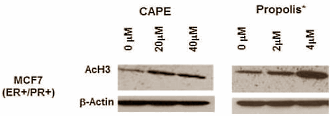
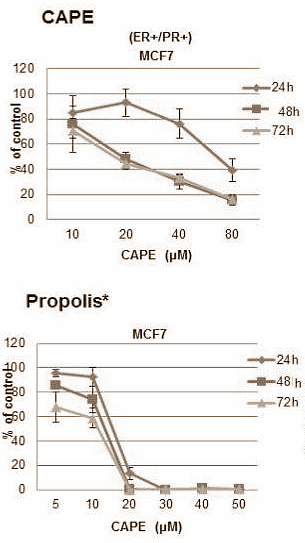
Antioestrogenic
The figure above shows that caffeic acid phenethyl ester kills above all propolis MCF-7 cells. The researchers also observed the same thing in cancer cells that had no receptors for estradiol or progesterone.
Although histone deacetylase inhibitors activate genes, propolis and caffeic acid phenethyl ester reduce the number of receptors for estradiol and progesterone in the MCF-7 cells. If propolis does the same in other cell types, then propolis might be an interesting for athletes who want to lower their oestrogen levels.

Conclusion
"These results of CAPE are present in the naturopathic formulation of propolis, a widely available natural substance with an extended safety record, making it a naturally-occurring and readily available epigenetic agent with great potential in breast cancer and oncology in general", the researchers conclude.
Source:
J Cancer Sci Ther. 2013 Oct 21;5(10):334-342.
More:
How propolis blocks skin aging 05.02.2021
Propolis versus CRP and TNF-alpha 30.12.2020
Propolis increases insulin sensitivity 06.06.2019
Archives:
Preventing & Surviving Cancer
Breast Cancer
Propolis
|









